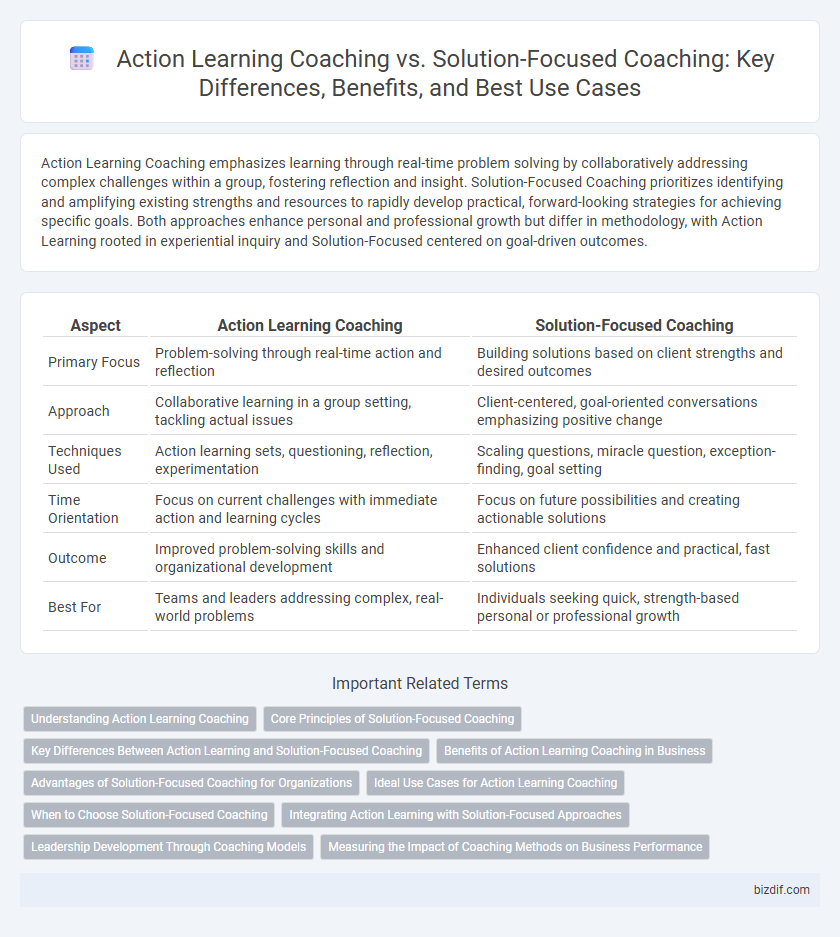Action Learning Coaching emphasizes learning through real-time problem solving by collaboratively addressing complex challenges within a group, fostering reflection and insight. Solution-Focused Coaching prioritizes identifying and amplifying existing strengths and resources to rapidly develop practical, forward-looking strategies for achieving specific goals. Both approaches enhance personal and professional growth but differ in methodology, with Action Learning rooted in experiential inquiry and Solution-Focused centered on goal-driven outcomes.
Table of Comparison
| Aspect | Action Learning Coaching | Solution-Focused Coaching |
|---|---|---|
| Primary Focus | Problem-solving through real-time action and reflection | Building solutions based on client strengths and desired outcomes |
| Approach | Collaborative learning in a group setting, tackling actual issues | Client-centered, goal-oriented conversations emphasizing positive change |
| Techniques Used | Action learning sets, questioning, reflection, experimentation | Scaling questions, miracle question, exception-finding, goal setting |
| Time Orientation | Focus on current challenges with immediate action and learning cycles | Focus on future possibilities and creating actionable solutions |
| Outcome | Improved problem-solving skills and organizational development | Enhanced client confidence and practical, fast solutions |
| Best For | Teams and leaders addressing complex, real-world problems | Individuals seeking quick, strength-based personal or professional growth |
Understanding Action Learning Coaching
Action Learning Coaching centers on solving real-time organizational challenges through group collaboration and reflective inquiry, fostering both individual growth and systemic change. This approach emphasizes leadership development, critical thinking, and continuous learning by integrating action and reflection cycles. Unlike Solution-Focused Coaching, which prioritizes rapid goal attainment, Action Learning Coaching nurtures deeper problem analysis and sustainable solutions through collective problem-solving dynamics.
Core Principles of Solution-Focused Coaching
Solution-Focused Coaching centers on leveraging clients' strengths and existing resources to create actionable, future-oriented goals. This coaching approach emphasizes small, achievable steps and solutions rather than analyzing problems in depth. Core principles include fostering client autonomy, maintaining a positive mindset, and utilizing scaling questions to measure progress effectively.
Key Differences Between Action Learning and Solution-Focused Coaching
Action Learning Coaching centers on solving real-time, complex problems through reflective inquiry and collaborative team learning, emphasizing the process over immediate solutions. Solution-Focused Coaching directs attention to clients' strengths and future goals, rapidly identifying actionable steps without delving deeply into problem analysis. The key difference lies in Action Learning's emphasis on group dynamics and transformative learning versus the solution-focused approach's goal-oriented, streamlined methodology.
Benefits of Action Learning Coaching in Business
Action Learning Coaching drives business innovation by encouraging teams to tackle real-time challenges through reflective problem-solving and collaborative learning, enhancing critical thinking skills. This approach fosters a culture of continuous improvement and accountability, directly impacting organizational performance and employee engagement. Companies employing Action Learning Coaching report accelerated decision-making and sustainable solutions, improving their competitive advantage.
Advantages of Solution-Focused Coaching for Organizations
Solution-Focused Coaching accelerates organizational growth by emphasizing practical solutions and fostering employee empowerment, leading to enhanced productivity and engagement. This approach cultivates a positive work environment through strengths-based dialogue and quick results, reducing time spent on problem analysis compared to Action Learning Coaching. Organizations benefit from scalable implementation and measurable outcomes, driving continuous improvement and innovation.
Ideal Use Cases for Action Learning Coaching
Action Learning Coaching excels in complex problem-solving scenarios where teams face ambiguous challenges requiring reflective inquiry and collaborative learning. It suits organizations aiming to enhance leadership skills, foster innovation, and drive systemic change through real-time action and feedback cycles. Ideal use cases include resolving multifaceted business issues, developing strategic initiatives, and promoting continuous team development in dynamic environments.
When to Choose Solution-Focused Coaching
Solution-Focused Coaching is ideal when clients need quick, actionable steps to achieve specific goals by leveraging existing strengths and resources. It excels in environments where forward momentum and practical outcomes are prioritized over deep problem analysis. Organizations aiming for rapid performance improvement and enhanced employee empowerment often benefit most from this coaching approach.
Integrating Action Learning with Solution-Focused Approaches
Integrating Action Learning with Solution-Focused Coaching enhances problem-solving by combining real-time learning and practical solutions, fostering deeper client insight and sustainable growth. This approach leverages the reflective inquiry of Action Learning to generate innovative solutions while utilizing Solution-Focused techniques to streamline goal achievement and maintain client motivation. The synergy between these methods accelerates behavioral change and empowers clients to tackle complex challenges effectively.
Leadership Development Through Coaching Models
Action Learning Coaching emphasizes real-time problem solving and reflective inquiry, enabling leaders to develop critical thinking and adaptive leadership skills. Solution-Focused Coaching centers on leveraging clients' strengths and past successes to accelerate goal achievement and enhance leadership effectiveness. Both models facilitate leadership development by promoting self-awareness, accountability, and strategic decision-making in dynamic organizational environments.
Measuring the Impact of Coaching Methods on Business Performance
Measuring the impact of Action Learning Coaching and Solution-Focused Coaching on business performance involves evaluating key metrics such as employee productivity, problem-solving efficiency, and goal achievement rates. Action Learning Coaching often drives improved team collaboration and innovation by addressing complex challenges in real-time, leading to measurable organizational growth. Solution-Focused Coaching typically accelerates individual performance improvements by targeting specific goals and leveraging strengths, resulting in faster attainment of business objectives.
Action Learning Coaching vs Solution-Focused Coaching Infographic

 bizdif.com
bizdif.com